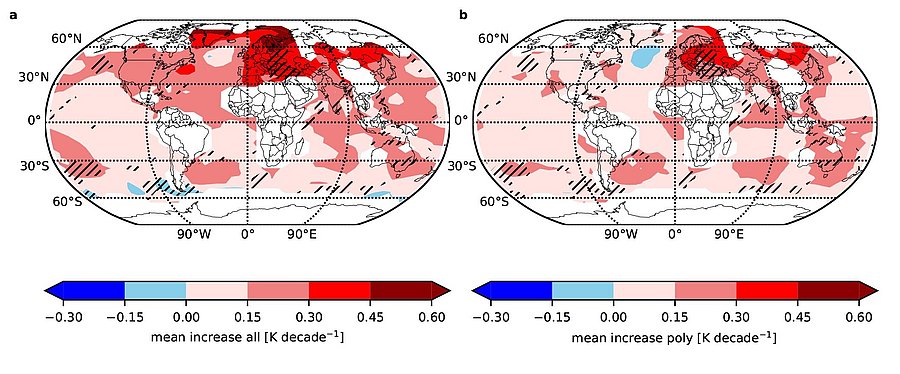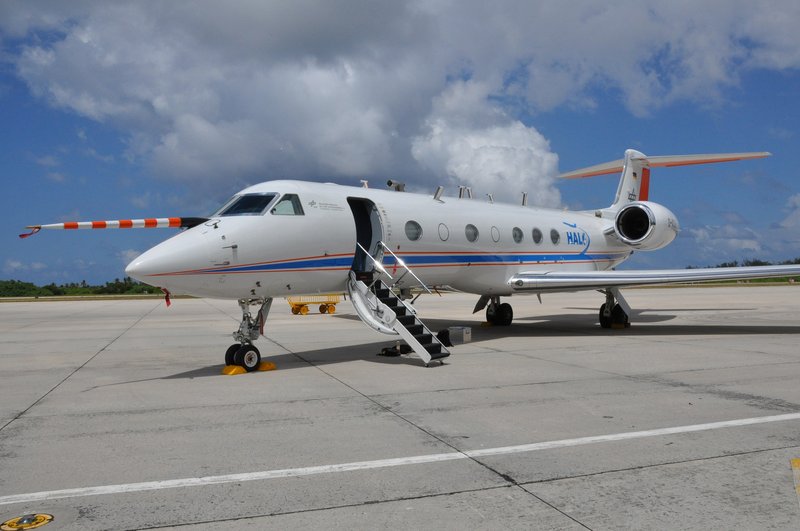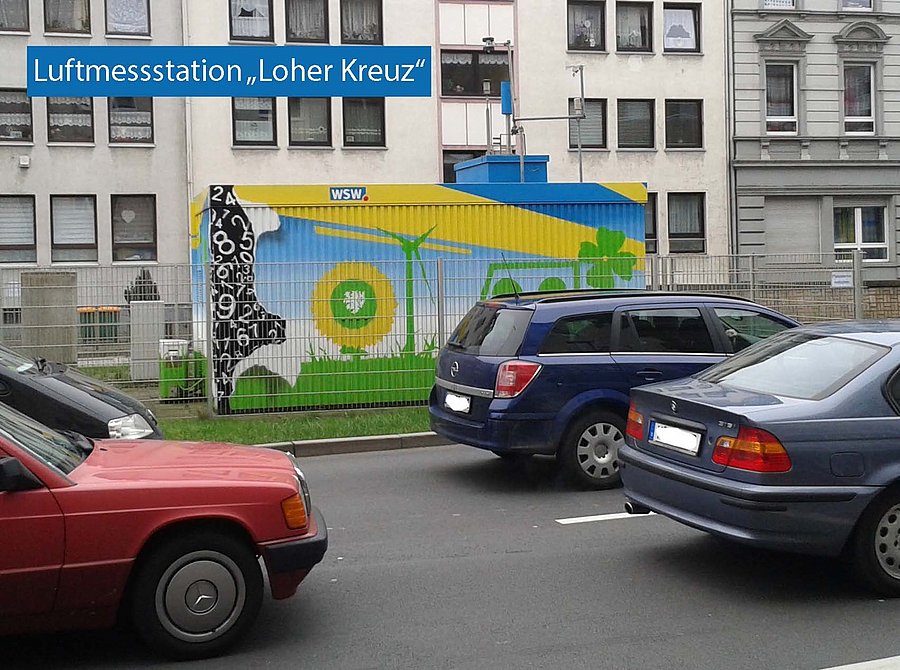Be able to better predict the effects of climate change: ARCADE satellite successfully launched into space
At the end of July, an Indian carrier rocket successfully launched into space. On board was the ARCADE (“Atmospheric Coupling and Dynamics Explorer”) satellite. ARCADE contains an innovative remote sensing device that experts from the Jülich Research Center and the Bergische Universität Wuppertal jointly developed. The first measurement data is expected at the end of the year. With their help, new insights into climate change are to be gained, among other things. [more]
On the trail of greenhouse gases: research aircraft HALO starts to a new measurement campaign
In the past, atmospheric researchers from various institutions have observed that the Asian monsoon not only has an impact on the Indian subcontinent through extreme rainfall, but also through the transport of heavily polluted air masses from the near-surface atmosphere in South and East Asia to the lower stratosphere over Europe – also influences the global climate. This transport is now to be examined in more detail with a new measurement campaign in which scientists from the Bergische Universität Wuppertal are also involved. [more]
Wuppertal's temperature measurements at an altitude of 100 kilometers: atmospheric- and environmental researcher Christoph Kalicinsky lives and works in a long-term experiment
In their search for causes and their effects on the atmosphere, researchers like Dr. Christoph Kalicinsky at Bergische Universität Wuppertal need perseverance. This is also the case in this experiment: “We have been observing temperatures at an altitude of around 87 kilometers from Wuppertal since the 1980s. And every clear night since then. This is a unique series of measurements because of its length.” The devices for this also come from Wuppertal. Scientists can answer some questions about climate change in this way, but they are only able to look into the future to a limited extent. [more]
Climate research at the highest level: EU initiative ACTRIS receives new status
In the ACTRIS initiative, numerous important research institutions across Europe cooperate to research the driving forces of climate change and air pollution and to improve climate models and their predictive power. The European Union has now given the initiative a new status - with far-reaching effects also for the University of Wuppertal: As a European Research Infrastructure Consortium, or ERIC for short, ACTRIS secures research on atmospheric processes under the direction of Prof. Dr. Peter Wiesen at the Institute for Atmospheric and Environmental Research for at least the next 15 to 20 years. [more]
New insights into the distribution of carbon dioxide in the atmosphere over India
A team of scientists from the University of Wuppertal and the Jülich Research Center were able to use high-resolution temporal and spatial measurements and model simulations to show for the first time how the greenhouse gas carbon dioxide (CO2) spreads over the Indian subcontinent to altitudes of up to 20 kilometers during the Asian summer monsoon. The study, which is based on previously unique measurements by atmospheric physicists at the Bergische University in the center of the Asian monsoon, has now been published in the journal Communications Earth & Environment from the Nature Portfolio. [more]
„Breathe2Change“ – new air quality measurement network in Tucuman/Argentina
Poor air quality is a global problem with serious negative consequences for people and the environment.
In Europe, air quality is monitored with the help of legally stipulated measuring methods, with which the concentration of selected air pollutants can be determined within a so-called measuring network. The procedures are expensive and require a lot of support, so they cannot be implemented in every region of the world. [more]
Atmospheric physicists study climate variations over time

In the last report of the Intergovernmental Panel on Climate Change (IPCC) it is suspected that natural climate variations can temporarily amplify or dampen the rise in temperature caused by man-made greenhouse gas emissions. Prof. Dr. Ralf Koppmann and Dr. Christoph Kalicinsky pursued this thesis as part of the project ROMIC-II (Role of the Middle Atmosphere in Climate). The latest results have now been published in the renowned journal "Scientific Reports" from the portfolio "Nature".[more]
Kick-off meeting of the Interdisciplinary Center for Atmosphere and Environment
The kick-off meeting of the Interdisciplinary Center for Atmosphere and Environment at the University of Wuppertal took place in mid-October. It forms the starting point for joint activities in research and teaching. The new competence center for environmental research at regional, national and international level is intended to contribute to a better understanding of environmental changes in soil, air and water.[more]
Atmospheric researchers from the new research infrastructure ACTRIS-D meet in Leipzig for the first time
Researchers from all over Germany met this week for the official launch of ACTRIS-D, a new infrastructure for researching fine dust particles, clouds and trace gases. Spread over eleven institutions, this German contribution to the EU research infrastructure ACTRIS will enable better forecasts for air quality, weather and climate in the future. Atmospheric researchers from the University of Wuppertal, led by Prof. Dr. Peter Wiesen are involved in this major project.[more]
"Because they don't do what they know"
Climate change, climate crisis, climate fight. The changes in our world are constantly increasing and people are feeling it first hand. Young people are rebelling and are sending clear signals with the Fridays for Future demos. Scientists worldwide have been aware of the consequences of these changes for years. But political measures are a long time coming.[more]
"Like a giant elevator" - new rapid routes of ozone-depleting substances into the stratosphere
New results show for the first time through direct observation that short-lived organic chlorine compounds, which are mainly produced and released into the atmosphere in Asia, are catapulted to over 14 kilometers in summer by the Asian monsoon and then distributed further globally in the lower stratosphere, where they where they contribute to the depletion of the ozone layer.[more]
Atmospheric research in Germany is being expanded significantly: Bergische Universität part of the new research infrastructure
Germany is getting a new infrastructure for researching fine dust particles, clouds and trace gases. Spread over eleven institutions, this German contribution to the EU research infrastructure ACTRIS (Aerosol, Clouds and Trace Gases Research Infrastructure) will enable better predictions for air quality, weather and climate in the future. Atmospheric researchers from the Bergische Universität under the direction of Prof. Dr. Peter Wiesen are involved in this major project. [more]
New interdisciplinary center for atmosphere and environment founded
Global environmental changes are the greatest challenge for the continued existence of mankind today. In addition to the ubiquitous discussion about climate change, changes in the other two environmental compartments, water and soil, pose a very big problem. At the Bergische Universität Wuppertal, extensive research is carried out on the subjects of air, soil and water. With the newly founded Interdisciplinary Center for Atmosphere and Environment (IZAU), these activities are now more closely interlinked. [more]
BMBF promotes collaborative project to understand climate change
As part of the "Role of the Middle Atmosphere in Climate (ROMIC-II)" program, the Federal Ministry of Education and Research (BMBF) promotes a collaborative project entitled "Impact of SOlar, Volcanic and Internal variability on Climate (ISOVIC)" with one Million euros. 360,000 euros of this goes to the Institute for Atmospheric and Environmental Research at the Bergische Universität Wuppertal. The project is coordinated by Prof. Dr. Ralf Koppmann. [more]
"ACTRIS-D" works on better forecasts for air quality, weather and climate
Improving climate models and their predictive power - this is one of the goals of the European research infrastructure for atmospheric aerosols, clouds and trace gases (ACTRIS). With ACTRIS-D, the Federal Ministry of Education and Research (BMBF) has now also set up a research infrastructure ... [more]
Scientists from Wuppertal participate in "LecturesForFuture"
Around 26,800 scientists say they support the "ScientistsForFuture" initiative. It is based on the "FridaysForFuture" movement in which students protest for a more consistent climate policy every Friday ...[more]
Researchers from Wuppertal measure the temperature of the upper atmosphere from space
Northwest China, December 22, 2018, 12:51 am Central European time: The rocket of the type "Long March 11" successfully takes off from the Jiuquan spaceport. On board is a satellite ...[more]
Research mission in Kap Verde: Use HALO to investigate air pollution over the Atlantic
"Sal instead of Wuppertal" is the saying currently for Prof. Dr. Ralf Koppmann and his team from the Institute for Atmospheric and Environmental Research. The Cape Verdean island is the headquarters of the research mission CAFE-Africa in the coming weeks (Chemistry of the Atmosphere Field Experiment in Africa)...[more]
New research field for atmospheric chemists: Project for indoor air pollution started
"We spend 80 to 90 percent of our lives indoors. Nevertheless, we atmospheric chemists have so far paid little attention to the processes in indoor air." It was therefore natural for Prof. Dr. Peter Wiesen that the Institute of Atmospheric and Environmental Research of the University of Wuppertal participates in the "Indoor Air Pollution Network" - in short: INDAIRPOLLNET.[more]
Prof. Dr. Martin Riese was appointed to the Advisory Group of the satellite mission FORUM
Only two concepts have the chance to become the ninth Earth Explorer mission of the European Space Agency ESA: FORUM and SKIM. In both projects, Mission Advisory Groups are now starting to work out the respective scientific potential. Also, Prof. Dr. Martin Riese from the Institute for Atmospheric and Environmental Research at the University of Wuppertal is involved in this comitee: The scientist from Forschungszentrum Jülich was appointed to the ten-member FORUM Mission Advisory Board. There he collaborates with researchers from Germany, Italy, France, Great Britain and Belgium.[more]
How fast does the detergent of the atmosphere work? German-Argentinian cooperation project on atmospheric chemistry started

Wherever gasoline or solvents are used, special partially oxygenated organic compounds enter the atmosphere through evaporation. There, these substances, which include, for example, unsaturated esters, ketones or alcohols, are degraded by OH radicals– the so-called detergent of the atmosphere. Scientists at the University of Wuppertal are investigating how quickly this degradation will take place and what products will be produced during the next three years - amongst other things with the help of a photoreactor.[more]
1.2 million euros for atmospheric researchers in Wuppertal

The working group atmospheric physics around Prof. Dr. Ralf Koppmann, Prof. Dr. Michael Volk and Dr. Marc Krebsbach at the Institute for Atmospheric and Environmental Research at the Bergische Universität Wuppertal was successful with four project proposals. The German Research Foundation (DFG) is funding a total of 1.2 million euros of three projects with the research aircraft HALO and an innovative project to measure hydrogen isotope ratios in atmospheric organic compounds. [more]
Air quality measurements in Wuppertal

In the course of a restructuring of the North Rhine-Westphalian measurement network to control the air quality, the Bergische Universität took over the air measuring station at Loherkreuz, Wuppertal, together with the city of Wuppertal. [more]
The current measured values of ozone, PM10, NO2 and NOx are available here: http://phychem.pcsg-server.de/Messwerte/Tag
